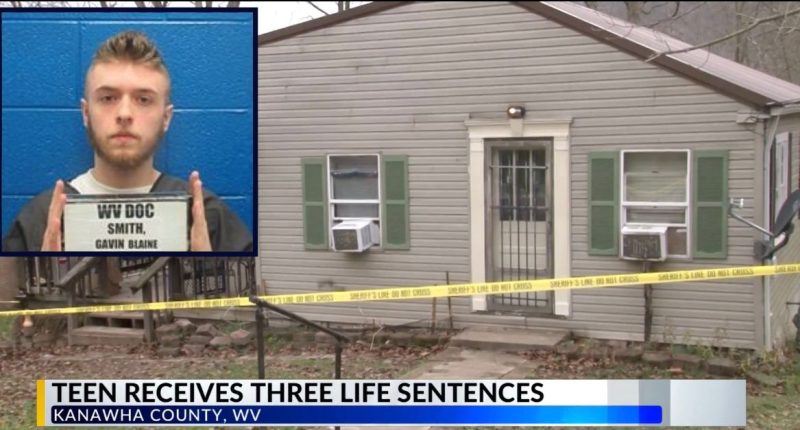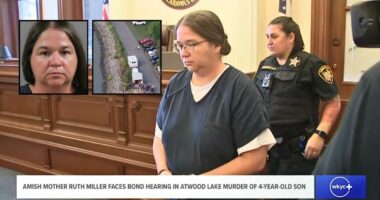Share this @internewscast.com
Inset: Gavin Smith (West Virginia Dept. of Corrections). Background: The home where Smith allegedly killed four family members in 2020 (WOWK).
Gavin Smith, a 21-year-old from West Virginia, who was previously found guilty of murdering his mother, stepfather, and two younger brothers, will have a new trial. The state’s Supreme Court of Appeals vacated his convictions on three counts of first-degree murder and one count of second-degree murder relating to the 2022 killings, along with his conviction for using a firearm during a felony.
The decision came from a five-judge panel on the state’s highest court, which voted 4-1, stating that the trial judge made a “reversible error.” The judge had incorrectly instructed the jury that since Smith was a minor when the murders occurred, a first-degree murder guilty verdict would make him automatically eligible for parole after 15 years.
Smith was 16 years old when authorities say he fatally shot Daniel Dale Long, 37, Risa Mae Saunders, 39, Gage Ripley, 12, and Jameson Long, 3.
This issue surfaced during Rebecca Walker’s testimony, who was Smith’s girlfriend when the shootings happened. Walker, 17 at that time, faced multiple first-degree murder charges but reached a plea deal. She pleaded guilty to four counts of accessory after the fact to first-degree murder, agreeing to a maximum 10-year prison term and an obligation to testify against Smith during his trial.
During her testimony, Walker said that she was facing a possible life sentence for first-degree murder before agreeing to a plead guilty. The state objected, arguing that “the jury was left with the erroneous impression that Mr. Smith would ‘be locked up for the rest of his life’ if he was convicted of first-degree murder.
After the close of evidence, the state argued that jurors may have been confused by Walker’s testimony about her potential sentence and an explanation from the court that juveniles convicted of first-degree murder in the state are eligible for parole after 15 years.
“[R]ight now the jury may think that he can only get 15 years for first-degree murder, and we’re concerned that the jury would be confused about that,” prosecutors said. The judge granted prosecutors’ request to clearly instruct the jury that Smith was facing a possible life sentence and would only be “eligible” for parole after 15 years.
Smith’s defense attorney objected, arguing that jurors were “supposed to be considering the facts, not considering the sentence,” saying the jury instruction “puts it right out there for them to be thinking about sentences.”
The court’s majority agreed with Smith’s counsel, reasoning that jurors are not permitted to consider “sentencing issues or other related issues that may flow from sentencing, such as parole or probation, when deliberating a verdict during a criminal trial.” Put another way, the court wrote that “questions pertaining to parole rights are not germane to the question of guilty or innocence.”
“While the State attempts to argue that Mr. Smith was not prejudiced by this instruction, other than describing the elements for first- and second-degree murder, the State cites to no law to support its contention that Mr. Smith suffered no prejudice,” the court wrote. “Despite attempting to argue that there was no prejudice, the State conceded that this penalty instruction ‘likely alleviated any jury question that someone who had not yet reached the age of 20 would not be forced to spend his entire life in prison with no hope of parole.””
“In other words,” the order continues, “this improper instruction eased any concern the jury may have had about forcing a juvenile to spend the rest of his life in prison.”
As Law&Crime previously reported, Smith’s grandfather on Dec. 13, 2020, found the family murdered in their home in the 1300 block of Cemetery Hill Drive in Elkwood, West Virginia. Each had suffered fatal gunshot wounds. Authorities said the likely motive for the murders was that Smith’s family wouldn’t let him see Walker.
Walker also admitted to encouraging Smith to kill his family.
Smith has not contested that he killed his family. His defense has been focused on asserting that he had not “formed the requisite intent to be convicted of first-degree murder,” court documents show.















